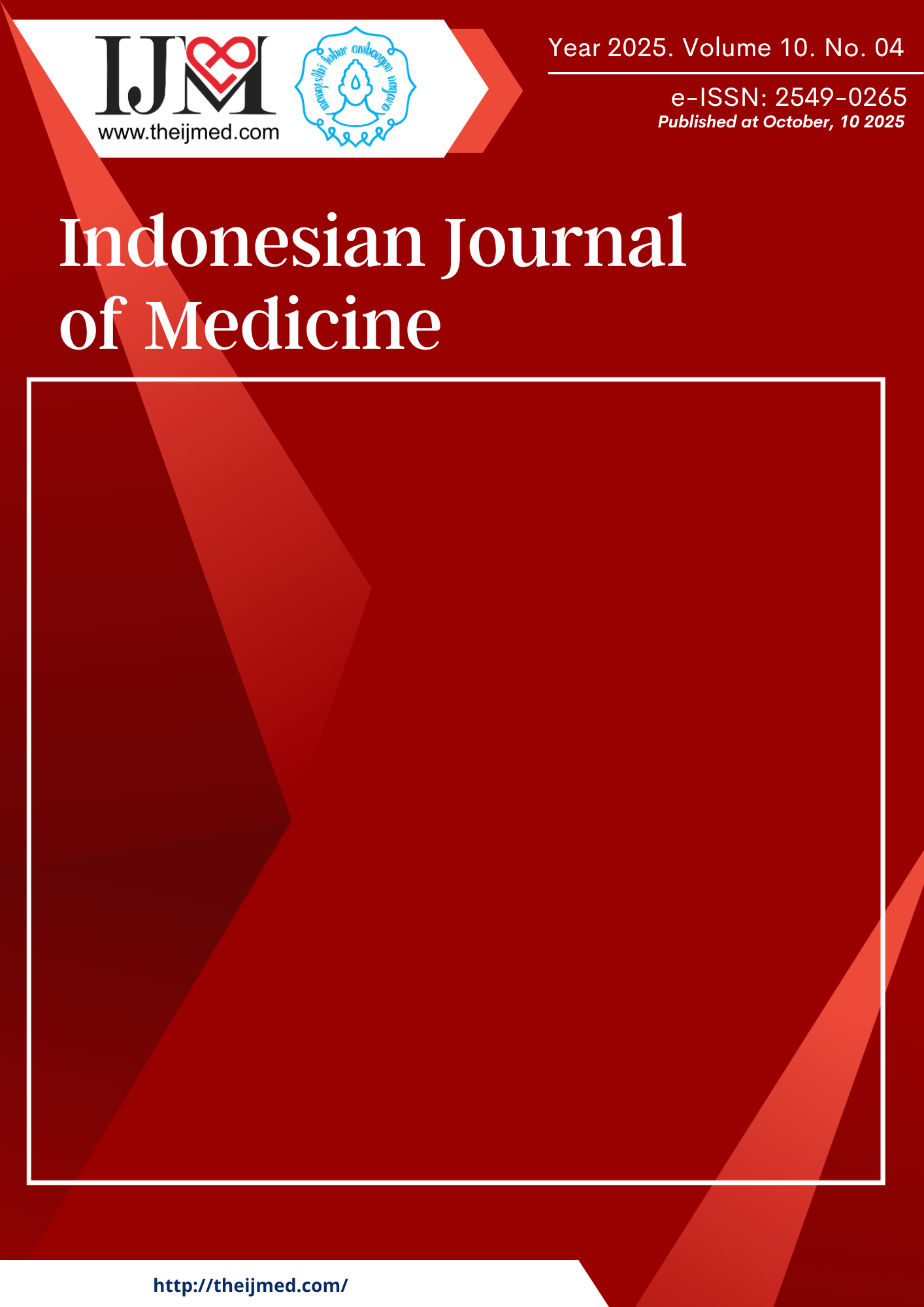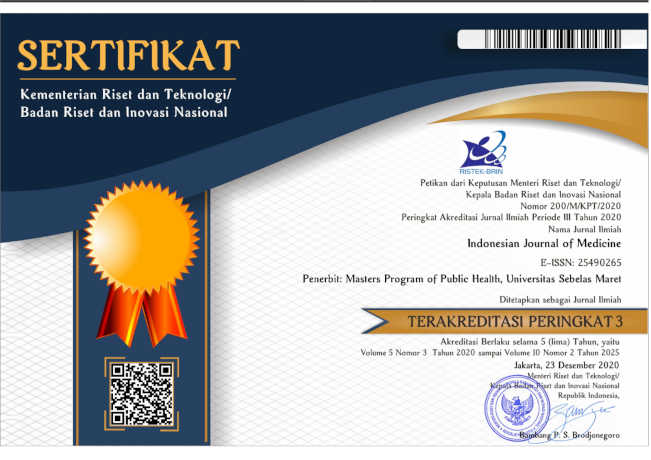Anti-inflammatory and Anti-infertility Effects of Ethanol Extract of Turmeric (Curcuma longa) in Male Wistar Rats with Type 2 Diabetes Mellitus Induced by Streptozotocin-Nicotinamide-High Fat Diet
DOI:
https://doi.org/10.26911/theijmed.2025.10.4.891Abstract
Background: Type 2 diabetes mellitus (T2DM) is a complex metabolic disorder associated with chronic inflammation and male reproductive dysfunction. The ethanol extract of turmeric (Curcuma longa) has demonstrated potential as an alternative therapeutic agent due to its anti-inflammatory and reproductive restorative properties. This study aims to analyze the anti-inflammatory and anti-infertility effects of the ethanol extract of Curcuma longa in male Wistar rats with T2DM induced by a streptozotocin-nicotinamide-high fat diet (STZ-NA-HFD).
Subjects and Method: Thirty male Wistar rats were randomized into six groups (n=5): normal control (K1), diabetic control (K2), positive control (T2DM + metformin 45 mg/kgBW, K3), and three treatment groups receiving Curcuma longa extract at doses of 50 mg/kgBW (K4), 100 mg/kgBW (K5), and 150 mg/kgBW (K6). Diabetes was induced with STZ (55 mg/kgBW) and nicotinamide (120 mg/kgBW). Blood glucose, IL-6, testosterone levels, sperm count, and sperm motility were evaluated after 21 days of treatment.
Results: The turmeric extract significantly reduced blood glucose levels (p<0.001) and IL-6 concentrations from 574.06±68.99 to 214.06±78.71 ng/mL at a dose of 150 mg/kgBW (p<0.001). Normal sperm motility increased significantly at 150 mg/kgBW (20.0±2.55%) compared to the diabetic control (8.40±2.07%) (p=0.008).
Conclusion: The ethanol extract of Curcuma longa demonstrated significant anti-inflammatory activity by reducing IL-6 levels and improving glycemic control. Its anti-infertility effect was reflected by enhanced sperm motility, particularly at the 150 mg/kgBW dose. These findings indicate that Curcuma longa possesses potential as an adjuvant therapy for the management of T2DM and its associated complications.
Keywords:
Type 2 diabetes mellitus, Curcuma longa, anti-inflammatory, fertility, interleukin-6, spermatogenesis, Type 2 diabetes mellitus, Curcuma longa, anti-inflammatory, fertility, interleukin-6, spermatogenesisReferences
Adab Z, Eghtesadi S, Vafa MR, Heydari I, Shojaii A, Haqqani H, Ghayour-Mobarhan M, et al (2019). Effect of turmeric on glycemic status, lipid profile, hs-CRP, and total anti-oxidant capacity in hyperlipidemic type 2 diabetes mellitus patients. Phytother Res. 33(4): 1173-1181. doi: 10.1002/ptr.6312
Akomolafe SF, Aluko BT (2020). Protective effect of curcumin on fertility in cyclophosphamide exposed rats: involvement of multiple pathways. J Food Biochem. 44(1): e13073. doi: 10.1111/jfbc.13095
Al-Goblan AS, Al-Alfi MA, Khan MZ (2014). Mechanism linking diabetes mellitus and obesity. Diabetes Metab Syndr Obes. 7: 587-591. doi: 10.2147/DMSO.S67400
Alfadul H, Sabico S, Al-Daghri N (2022). The role of interleukin-1β in type 2 diabetes mellitus: a systematic review and meta-analysis. Front Endocrinol. 13: 901616. doi: 10.33-89/fendo.2022.901616
Almalki DA, Alghamdi SA, Al-Attar AM (2019). Comparative study on the influence of some medicinal plants on diabetes induced by strepto-zotocin in male rats. Biomed Res Int. 2019: 3596287. doi: 10.1155/-2019/3596287
American Diabetes Association (2022). Classification and Diagnosis of Diabetes: Standards of Medical Care in Diabetes-2022. Diabetes Care. 45(Suppl 1): S1-S264. doi: 10.2337/dc22-S002
Belhan S, Yıldırım S, Huyut Z, Özdek U, Oto G, Algül S (2020). Effects of curcumin on sperm quality, lipid profile, antioxidant activity and histopathological changes in streptozotocin-induced diabetes in rats. Andrologia. 52(6): e13595. doi: 10.1111/and.13584
Brandford PG (2013). Curcumin and obesity. IUBMB Life. 65(1): 78-87. doi: 10.1002/biof.1074
Chen L, Magliano DJ, Zimmet PZ (2012). The worldwide epidemiology of type 2 diabetes mellitus: present and future perspectives. Nat Rev Endocrinol. 8(4): 228-236. doi: 10.1038/nrendo.2011.183
Halim M, Halim A (2019). The effects of inflammation, aging and oxidative stress on the pathogenesis of diabetes mellitus (type 2 diabetes). Diabetes Metab Syndr. 13(2): 1165-1172. doi: 10.1016/j.dsx.2019.01.040
Hussain Y, Khan H, Alotaibi G, Khan F, Alam W, Aschner M, Jeandet P, et al (2022). How curcumin targets inflammatory mediators in diabetes: therapeutic insights and possible solutions. Molecules. 27(13): 4058. doi: 10.3390/molecules27134058
International Diabetes Federation (2019). IDF diabetes atlas. 9th ed. Brussels: International Diabetes Federation.
Kanter M, Aktas C, Erboga M (2013). Curcumin attenuates testicular damage, apoptotic germ cell death, and oxidative stress in streptozotocin-induced diabetic rats. Mol Nutr Food Res. 57(9): 1578-1585. doi: 10.1002/mnfr.201200170
Kato M, Nishikawa S, Ikehata A, Dochi K, Tani T, Takahashi T, Imaizumi A, et al (2017). Curcumin improves glucose tolerance via stimulation of glucagon-like peptide-1 secretion. Mol Nutr Food Res. 61(3): 1600471. doi: 10.1002/mnfr.201600471
Khoei HH, Fakhri S, Parvardeh S, Shams Mofarahe Z, Ghasemnejad-Berenji H, Nazarian H, Mohammadi-Motlagh HR (2019). Testicular toxicity and reproductive perfor-mance of streptozotocin-induced diabetic male rats: the ameliorating role of silymarin as an antioxidant. Toxin Rev. 38(3): 223-233. doi: 10.1080/15569543.2018.1444641
Lin C, Shin DG, Park SG, Chu SB, Gwon LW, Lee JG, Kim DH, et al (2015). Curcumin dose-dependently improves spermatogenic disorders induced by scrotal heat stress in mice. Food Funct. 6(12): 3770-3777. doi: 10.1039/c5fo00726g
Marton LT, Pescinini-Salzedas LM, Camargo MEC, Barbalho SM, Haber JFDS, Sinatora RV, Detregiachi CRP (2021). The effects of curcumin on diabetes mellitus: a systematic review. Front Endocrinol. 12: 669448. doi: 10.3389/fendo.2021.669448
Mostafavinia A, Amini A, Ghorishi SK, Pouriran R, Bayat M (2016). The effects of dosage and the routes of administrations of streptozotocin and alloxan on induction rate of type 1 diabetes mellitus and mortality rate in rats. Lab Anim Res. 32(3): 160-165. doi: 10.5625/lar.2016.32.3.160
Nancy Obaji N, Johnson A, Oji Ifegwu N (2021). Combined effect of aqueous extracts of Zingiber officinale and Curcuma longa on male reproductive hormones of male wistar rats. JETIR. 8(6): b123-b130.
PERKENI (2019). Pedoman pengelolaan dan pencegahan diabetes melitus tipe 2 dewasa di Indonesia. Jakarta: Perkumpulan Endokrinologi Indonesia.
Pivari F, Mingione A, Brasacchio C, Soldati L (2019). Curcumin and type 2 diabetes mellitus: prevention and treatment. Nutrients. 11(8): 1837. doi: 10.3390/nu11081837
Rashid K, Sil PC (2015). Curcumin ameliorates testicular damage in diabetic rats by suppressing cellular stress-mediated mitochondria and endoplasmic reticulum-dependent apoptotic death. Biochim Biophys Acta. 1852(1): 70-82. doi: 10.1016/-j.bbadis.2014.11.007
Rivera-Mancía S, Trujillo J, Chaverri JP (2018). Utility of curcumin for the treatment of diabetes mellitus: evidence from preclinical and clinical studies. J Nutr Intermed Metab. 14: 29-41. doi: 10.1016/-j.jnim.2018.05.001
Wang YW, He SJ, Feng X, Cheng J, Luo YT, Tian L, Huang Q (2017). Metformin: a review of its potential indications. Drug Des Devel Ther. 11: 2421-2429. doi: 10.2147/DDDT.S141675
Weisberg SP, Leibel R, Tortoriello DV (2008). Dietary curcumin significantly improves obesity-associated inflammation and diabetes in mouse models of diabesity. Endocrinology. 149(7): 3549-3558. doi: 10.1210/en.2008-0262
Wickenberg J, Ingemansson SL, Hlebowicz J (2010). Effects of Curcuma longa (turmeric) on postprandial plasma glucose and insulin in healthy subjects. Nutr J. 9: 43. doi: 10.11-86/1475-2891-9-43
Zhao L, Gu Q, Xiang L, Dong X, Li H, Ni J, Wan L, Cai G (2017). Curcumin inhibits apoptosis by modulating Bax/Bcl-2 expression and alleviates oxidative stress in testes of streptozotocin-induced diabetic rats. Ther Clin Risk Manag. 13: 1099-1105. doi: 10.2147/TCRM.S141738











